AMMAN // She is a woman and an outspoken Bedouin - two strikes against any candidate running for parliament in Jordan. But Hind Al Fayez is determined to overcome the odds.
After failing twice, she is determined to win a seat in Jordan's parliament next year when elections are held again. In fact, she is certain of it.
"I'll be in parliament this time, I know it," she said defiantly recently. "You'll call me up then and congratulate me".
Ms Al Fayez's confidence is not entirely misplaced. Her candidacy has been bolstered by increasing public dissatisfaction with the pace of reform in Jordan and by upheavals elsewhere in the Arab world this year.
At the same time, she is not naive. She blames her unsuccessful first run for parliament in 2007 on her failure to do her "homework".
Her loss in elections last year, she said, was the fault of an overzealous Mukhabarat, Jordan's domestic intelligence agency, which she accuses of sabotaging any candidate who campaigned for a parliament that would do more than serve as a rubber stamp for the palace.
The next election will be different, she said. "With the Arab Spring, I don't think they can play like this again," she said.
Ms Al Fayez also thinks she can promote an idea whose time has come. She plans to campaign on a platform of challenging the traditional path for economic development among Jordan's Bedouin.
For four decades, she said, Jordan's Bedouin have followed the government's prescribed path of a job in a government ministry or military service.
As a result, economic development among the Bedouin has lagged. She described the economic situation of Central Badia district, which she hopes to represent in parliament, as "terrible". Her goal, she said, is to persuade Jordan's Bedouin that participation in the private sector, which is currently dominated by Jordanians of Palestinian descent, is the path to economic prosperity and political influence. "My mission is ... to open their eyes, to tell them it's time to give up on the government jobs," she said.
Although Bedouin account for only about 10 per cent of Jordan's 6.4 million people, they have traditionally enjoyed a degree of political power disproportionate with their size, forming a bedrock of support for the Hashemite dynasty that has ruled Jordan since independence in 1946.
That support has eroded this year as Jordan, like other Arab countries, have been swept up in the demand for reform, especially an end to corruption.
While a majority of Jordanians have not reached the same level of frustration and anger as Egyptians and Syrians, they are "discontented", said Hasan Al Momani, the director of the Regional Centre on Conflict Prevention at the Jordan Institute of Diplomacy in Amman.
"We have a really deep distrust between the government and the citizens."
Under growing pressure to enforce anti-corruption measures and speed up political reform, King Abdullah II has appointed a new prime minister.
He also has promised electoral and constitutional reform, though he has given no timetable, leading many to question whether the king will meet his promises and to whether such halting steps will be enough to calm the rising tide of frustration.
Ms Al Fayez could hardly be described as marginalised in Jordanian society. She is well-educated, comes from an affluent family and her cousin, Faisal Al Fayez, was Jordan's prime minister from 2003-2005.
Though privileged and powerful, she said she will not be content until that prosperity and political influence is more widely shared by members of her tribe.
"My mission is to make a change," she said.






